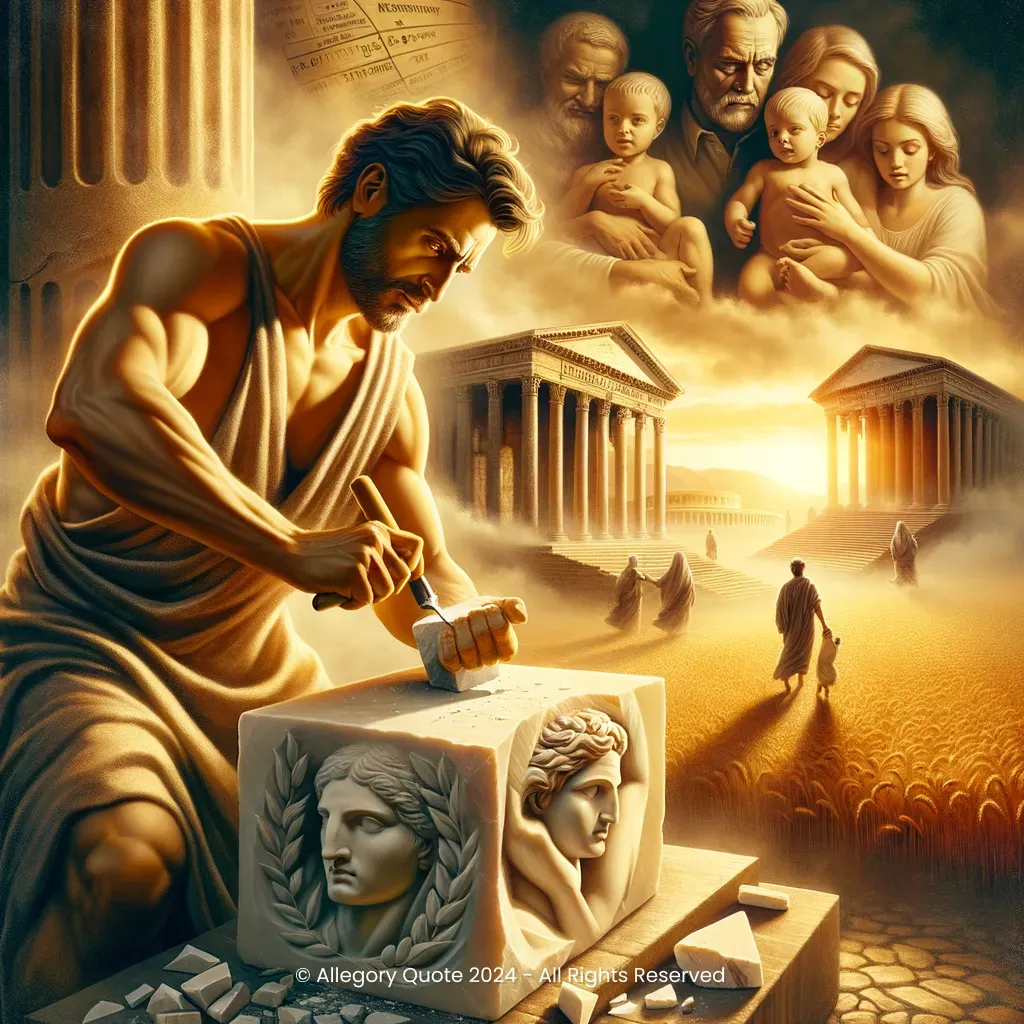Suae quisque fortunae faber

0
0
0
0
- Meaning
- The phrase "Suae quisque fortunae faber" suggests that individuals are responsible for shaping their own destinies. It embodies the idea that through their actions, decisions, and perseverance, people can influence their future, taking control of their outcomes rather than leaving them to chance or external circumstances. Philosophically, it speaks to the power of human agency and self-determination.
- Allegory
- The sculptor represents the individual taking active control of their destiny, chiseling away at the marble, symbolizing the shaping of one's future. The potential futures looming in the mist symbolize the various successful outcomes that can be achieved through personal effort, representing career, family, and prosperity. The warm golden light in the background suggests possibilities and hope, emphasizing the positive aspects of taking control of one's life. Shadows hint at the challenges one might face, adding depth to the image and acknowledging that the path to shaping one's fortune is not without obstacles.
- Applicability
- This phrase can be especially motivating in personal and professional contexts. It encourages individuals to take actionable steps toward their goals, emphasizing the importance of hard work, proactive behavior, and resilience. Whether you're aiming to advance in your career, improve your relationships, or achieve personal growth, this proverb serves as a reminder that your efforts significantly impact your success.
- Impact
- The impact of this phrase has been profound, resonating across centuries as a motivational and philosophical tenet. It influences modern self-help philosophies and motivational speaking, reinforcing the value of personal responsibility. This proverb has inspired numerous works of literature, leadership discourses, and educational programs focused on empowerment and self-determination. It’s often invoked in discussions about leadership, entrepreneurship, and self-improvement.
- Historical Context
- The historical context of this phrase dates back to ancient Rome, specifically the era of Appius Claudius Caecus, who lived during the late 4th century BCE. Rome was heavily influenced by ideas of virtue, personal responsibility, and civic duty. Appius Claudius Caecus was a prominent figure in Roman politics and infrastructure, and his contributions included moral and ethical guidance through his maxims.
- Criticisms
- Criticisms of this phrase might come from perspectives that emphasize the role of external factors in shaping one's fortune. Critics argue that systemic inequalities, socio-economic conditions, and unforeseen circumstances also play a crucial role in determining outcomes, and the phrase's emphasis on individual responsibility might overlook these critical aspects. There is a debate about balancing personal effort with recognizing external influences.
- Variations
- There exist variations and interpretations of this phrase in different cultures. In Eastern philosophies, particularly within Buddhist and Hindu traditions, there is an emphasis on karma and the notion that one's actions in this life (and previous lives) determine future circumstances. While Western tradition focuses more on individual effort, Eastern traditions may emphasize a combination of personal action and the cosmic order.
-

Tempus fugit.
-

Spes ultima dea.
-

What is past is prologue.
-

Perseverando vinces.
-

Aquila non capit muscas.
-

Nemo propheta in patria.
-

Citius, altius, fortius.
-

Per aspera ad astra.
-

Ubi bene, ibi patria.
-

Homo sum, humani nihil a me alienum puto.
No Comments